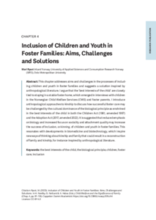This chapter in the book "Child Welfare and the Value of Family Privacy" addresses aims and challenges in the processes of including children and youth in foster families and suggests a solution inspired by anthropological literature. The author argues that the ‘best interests of the child’ are closely tied to staying in a stable foster home, which emerged in interviews with children in the Norwegian Child Welfare Services (CWS) and foster parents.
The author introduces anthropological approaches to kinship to discuss how successful foster care may be challenged by the cultural dominance of the biological principle as enshrined in the best interests of the child in both the Children Act (1981, amended 1997) and the Adoption Act (2017, amended 2022). It is suggested that reduced emphasis on biology and increased focus on sociality and attachment quality may increase the success of inclusion, or kinning, of children and youth in foster families. This resonates with developments in biomedicine and biotechnology, which inspire new ways of thinking about kinship and family that could result in a reconstruction of family and kinship, for instance inspired by anthropological literature

